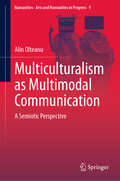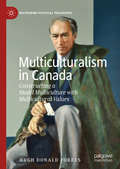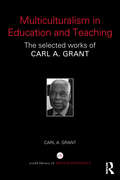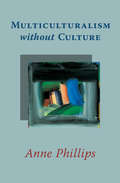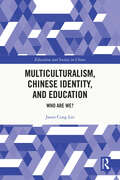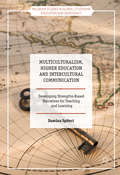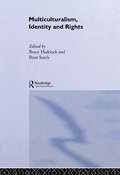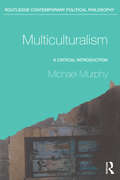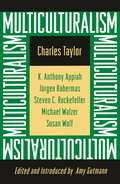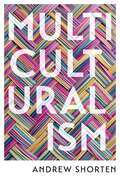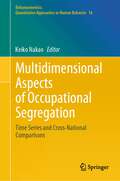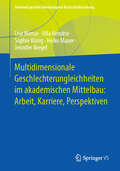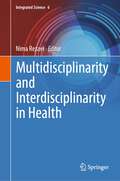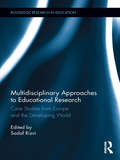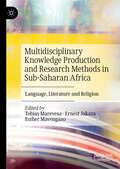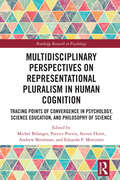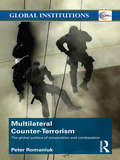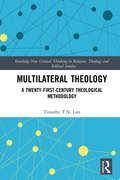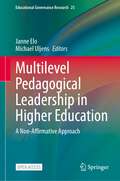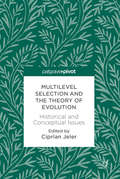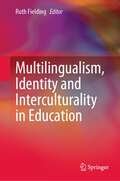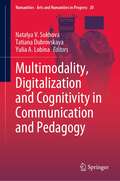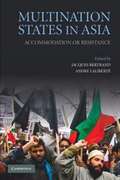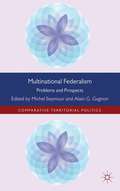- Table View
- List View
Multiculturalism as Multimodal Communication: A Semiotic Perspective (Numanities - Arts and Humanities in Progress #9)
by Alin OlteanuThis highly readable book develops a numanistic, and specifically semiotic approach to multiculturalism. It reveals how semiotics provides fresh and valuable insights into multiculturalism: in contrast to the binary logic of dualistic philosophy, semiotic logic does not understand the value of truth in rigid terms of ‘true’ or ‘false’, ‘right’ or ‘wrong’ only. The value of truth resides in meaning, which is a dynamic, evolutionary phenomenon, rooted, nevertheless, in factuality.Drawing on recent developments in biosemiotics, the book presents a theoretical approach to multiculturalism, regarding the lives of people living in multicultural environments. Rather than analyzing political or economic phenomena, it offers a semiotic analysis of multiculturalism and discusses its educational implications. It also invites readers to regard learning as a phenomenon of ecological sign growth and to understand multiculturalism along the same lines. As such, it brings together the life and social sciences and the humanities in a unified perspective, in an approach fitting postmodernism.Developing a postmodern philosophy for contemporary non-experts, which allows distancing from political discourse in favor of a posthumanistic stand, where altruism is seen as an opportunity, not a threat, this book appeals to a wide readership, from scholars seeking state-of-the-art theories to general readers looking for a thought-provoking and enlightening read.
Multiculturalism in Canada: Constructing a Model Multiculture with Multicultural Values (Recovering Political Philosophy)
by Hugh Donald ForbesMulticulturalism is often thought to be defined by its commitment to diversity, inclusivity, sensitivity, and tolerance, but these established values sometimes require contrary practices of homogenization, exclusion, insensitivity, and intolerance. Multiculturalism in Canada clarifies what multiculturalism is by relating it to more basic principles of equality, freedom, recognition, authenticity, and openness. Forbes places both official Canadian multiculturalism and Quebec's semi-official interculturalism in their historical and constitutional setting, examines their relations to liberal democratic core values, and outlines a variety of practical measures that would make Canada a more open country and a better illustration of what a commitment to egalitarian cultural pluralism now means. Consisting of a series of connected essays-including careful considerations of the works of Will Kymlicka and Charles Taylor-this book provides the first comprehensive account of multiculturalism in Canada.
Multiculturalism in Education and Teaching: The selected works of Carl A. Grant
by Carl A. GrantIn the World Library of Educationalists series, international experts compile career-long collections of what they judge to be their finest pieces – extracts from books, key article, salient research findings, major theoretical and practical contributions – so the world can read them in a single manageable volume. Readers will be able to follow the themes and strands and see how their work contributes to the development of the field. Carl A. Grant has spent the last 35 years researching, teaching, thinking and writing about some of the key enduring issues in multicultural education. He has contributed to a multitude of books and articles, and is former President of the National Association for Multicultural Education. In his selected works, Carl Grant brings together 14 of his key writings in one place. Starting with a specially written Introduction, which gives an overview of his career and contextualises his selection within the development of the field, the book is divided into three parts: - Race and Educational Equity - Theorizing Multicultural Education - Multicultural Teacher Education. This book not only shows how Carl Grant’s thinking developed during his long and distinguished career, it also gives an insight into the development of the fields to which he contributed.
Multiculturalism without Culture
by Anne PhillipsPublic opinion in recent years has soured on multiculturalism, due in large part to fears of radical Islam. In Multiculturalism without Culture, Anne Phillips contends that critics misrepresent culture as the explanation of everything individuals from minority and non-Western groups do. She puts forward a defense of multiculturalism that dispenses with notions of culture, instead placing individuals themselves at its core. Multiculturalism has been blamed for encouraging the oppression of women--forced marriages, female genital cutting, school girls wearing the hijab. Many critics opportunistically deploy gender equality to justify the retreat from multiculturalism, hijacking the equality agenda to perpetuate cultural stereotypes. Phillips informs her argument with the feminist insistence on recognizing women as agents, and defends her position using an unusually broad range of literature, including political theory, philosophy, feminist theory, law, and anthropology. She argues that critics and proponents alike exaggerate the unity, distinctness, and intractability of cultures, thereby encouraging a perception of men and women as dupes constrained by cultural dictates. Opponents of multiculturalism may think the argument against accommodating cultural difference is over and won, but they are wrong. Phillips believes multiculturalism still has an important role to play in achieving greater social equality. In this book, she offers a new way of addressing dilemmas of justice and equality in multiethnic, multicultural societies, intervening at this critical moment when so many Western countries are poised to abandon multiculturalism.
Multiculturalism, Chinese Identity, and Education: Who Are We? (Education and Society in China)
by Jason Cong LinIn Chinese societies, Chinese identity is an important yet controversial topic. This book examines official understandings of Chinese identity in Mainland China and Hong Kong, exploring how the latest governments of Mainland China and Hong Kong conceptualize Chinese identity; how government-endorsed textbooks frame it in different subjects; and how a multicultural approach can enhance understanding of identity in both societies. Using content analysis to support his theoretical arguments, Lin offers an in-depth, updated, and detailed picture of how the governments of Mainland China and Hong Kong, and their endorsed textbooks, encourage people in these societies to respond to the question of "who are we?". He also elaborates on how the current approach to understanding Chinese identity can be harmful, and examines how a multicultural approach could better fit these Chinese contexts and enhance understanding of "who are we?". Given that the question of identity causes trouble everywhere, and many countries are debating approaches to understanding diverse identities in their own societies, this book provides valuable insights into the Chinese perspective, to allow readers to more fully understand global frameworks of identity. This book will interest researchers and students in the fields of multiculturalism, multicultural education, national identity, identity politics, and China and Hong Kong studies.
Multiculturalism, Higher Education and Intercultural Communication: Developing Strengths-Based Narratives for Teaching and Learning (Palgrave Studies in Global Citizenship Education and Democracy)
by Damian SpiteriThis book explores how multiculturalism should be promoted throughout higher education due to its benefits for students. It adopts a strengths-based student-centred perspective and offers practical illustrations of how multicultural education can instigate students to understand each other and to relate to each other meaningfully. With the rise of international students in higher education across the globe it is crucial that institutions promote multicultural education for their wider communities.
Multiculturalism, Identity and Rights (Routledge Innovations in Political Theory #Vol. 12)
by Bruce Haddock Peter SutchThis innovative volume brings a selection of leading political theorists to the wide-ranging debate on multiculturalism and political legitimacy. By focusing on the challenge to mainstream liberal theory posed by the surge of interest in the rights of minority groups and subcultures within states, the authors confront issues such as rights, liberalism, cultural pluralism and power relations.
Multiculturalism: A Critical Introduction (Routledge Contemporary Political Philosophy)
by Michael MurphyWhat is multiculturalism and what are the different theories used to justify it? Are multicultural policies a threat to liberty and equality? Can liberal democracies accommodate minority groups without sacrificing peace and stability? In this clear introduction to the subject, Michael Murphy explores these questions and critically assesses multiculturalism from the standpoint of political philosophy and political practice. The book explores the origins and contemporary usage of the concept of multiculturalism in the context of debates about citizenship, egalitarian justice and conflicts between individual and collective rights. The ideas of some of the most influential champions and critics of multiculturalism, including Will Kymlicka, Chandran Kukathas, Susan Okin and Brian Barry, are also clearly explained and evaluated. Key themes include the tension between multiculturalism and gender equality, cultural relativism and the limits of liberal toleration, and the impact of multicultural policies on social cohesion ethnic conflict. Murphy also surveys the legal practices and policies enacted to accommodate multiculturalism, drawing on examples from the Americas, Australasia, Europe, Asia and the Middle East. Multiculturalism: A Critical Introduction is an ideal starting point for anyone coming to the topic for the first time as well as those already familiar with some of the key issues.
Multiculturalism: Expanded Paperback Edition (The University Center for Human Values Series #15)
by Charles TaylorA new edition of the highly acclaimed book Multiculturalism and "The Politics of Recognition," this paperback brings together an even wider range of leading philosophers and social scientists to probe the political controversy surrounding multiculturalism. Charles Taylor's initial inquiry, which considers whether the institutions of liberal democratic government make room--or should make room--for recognizing the worth of distinctive cultural traditions, remains the centerpiece of this discussion. It is now joined by Jürgen Habermas's extensive essay on the issues of recognition and the democratic constitutional state and by K. Anthony Appiah's commentary on the tensions between personal and collective identities, such as those shaped by religion, gender, ethnicity, race, and sexuality, and on the dangerous tendency of multicultural politics to gloss over such tensions. These contributions are joined by those of other well-known thinkers, who further relate the demand for recognition to issues of multicultural education, feminism, and cultural separatism. Praise for the previous edition:
Multiculturalism: The Political Theory of Diversity Today
by Andrew ShortenThe idea that diverse cultural and ethnic groups should co-exist within a country and that assimilation should not be forced upon immigrant groups – &“multiculturalism&” – was orthodoxy 20 years ago. Today it&’s coming under pressure. In this introduction to the political theory of multiculturalism, Andrew Shorten surveys the leading theories of multiculturalism, the critiques that have been levelled against the idea, and the debates surrounding cohesion, integration and diversity. He then goes on to demonstrate how multicultural political theory can be renewed, arguing that a single, monolithic vision of multiculturalism must be replaced by a multiculturalism made up of different strands, responding to distinctive but interrelated issues, and inspired by real-world policy debates about how political communities should respond to differences of religion, language and nationality. After tracing the influence of earlier multicultural ideas on these debates, Shorten reveals some new and surprising possibilities for mutual learning. Containing an up-to-date overview of multicultural political theory and its various offshoots, this book is essential reading for students and scholars interested in the politics of cultural, religious, linguistic and national diversity.
Multidimensional Aspects of Occupational Segregation: Time Series and Cross-National Comparisons (Behaviormetrics: Quantitative Approaches to Human Behavior #18)
by Keiko NakaoOne of the strengths of this book is that it expresses occupational segregation from multidimensional viewpoints using correspondence analysis. Through a quantitative approach, the book examines occupational segregation by education and gender in response to industrial transformation in Japan and other countries. The transformation of industrial structure, such as post-industrialization, demands a reconsideration of traditional perspectives in sociology, especially in social stratification. In other words, it is a shift from the attribute to the achievement principle. Higher technological innovations will create higher levels of industries, and those industries will require jobs that need greater human capital. In short, the meritocracy will be promoted. Meritocracy is certainly considered persuasive. In fact, previous researchers have looked primarily at a person’s occupation as a measure of social status. In Japan, jobs are normally acquired after completing education; thus, one’s educational achievement plays an important role. Especially in recent years, however, education alone has not been enough to explain social status. This book, therefore, focuses on occupational segregation by gender in addition to education in post-industrial society. Can occupational segregation by gender be weakened in the highly educated group? Is this a universal story in modern society? Because post-industrialization is part of the larger story of modernization, international perspectives are needed to examine the linkage between education and gender occupational segregation. This book explores occupational segregation by gender in response to industrial transformation in Japan and other countries.
Multidimensional Democracy
by Jeffrey J. HardenMultidimensional Democracy examines political representation from the supply (legislator) and demand (constituent) perspectives. Focusing on four dimensions - policy, service, allocation, and descriptive representation - it documents systematic variation in what people want from legislators and what legislators choose to emphasize while in office. It has important implications for the study of representation, as well as normative questions about political inequality in America. The demand-side results show that constituents who are economically advantaged tend to prefer policy-based representation while the disadvantaged place relatively more importance in constituent service and/or allocation. Suggestive results from the legislator data complement this finding; legislators in wealthy, white districts tend to focus more on policy while those representing economically disadvantaged and racially diverse districts may place more emphasis on service and/or allocation. A likely consequence is that the policy choices made by representatives reflect the policy preferences of the economically advantaged because policy representation is what those citizens want.
Multidimensionale Geschlechterungleichheiten im akademischen Mittelbau: Arbeit, Karriere, Perspektiven (Jahrbuch geschlechterbezogene Hochschulforschung)
by Lisa Mense Ulla Hendrix Heike Mauer Jennifer Niegel Sophie KönigIm „Jahrbuch geschlechterbezogene Hochschulforschung NRW“ werden regelmäßig Forschungsergebnisse zu Geschlechter(un)gleichheiten an Hochschulen veröffentlicht. Diese basieren auf detaillierten Analysen hochschulstatistischer und eigens erhobener Befragungsdaten. Der vorliegende Band beschäftigt sich mit einem hoch relevanten wissenschafts- und gleichstellungspolitischem Thema: der Situation der Beschäftigten im akademischen Mittelbau an Hochschulen. Aus einer multidimensionalen Geschlechterperspektive werden aktuelle Beschäftigungsverhältnisse (auch unter Bedingungen der Coronapandemie) untersucht. Spezifische Erfahrungen von Benachteiligung, die mit verschiedenen Ungleichheitskategorien wie sozialer Herkunft, Migrations- und Rassismuserfahrungen, körperlichen und gesundheitlichen Beeinträchtigungen, geschlechtlicher Vielfalt und sexueller Orientierung verbunden sind, stehen ebenso im Fokus wie die Frage, welche Ressourcen und Unterstützung Mittelbauangehörige im Rahmen ihrer Beschäftigung mobilisieren können. Die Studie enthält sekundärstatistische Analysen hochschulbezogener Daten und Auswertungen einer eigenen Online-Befragung der Mittelbaubeschäftigen an nordrhein-westfälischen Hochschulen zu ihrer Beschäftigungssituation, ihren Erfahrungen und Perspektiven.
Multidisciplinarity and Interdisciplinarity in Health (Integrated Science #6)
by Nima RezaeiThe contributed volume "Multidisciplinarity and Interdisciplinarity in Health" is a health-centered volume of the Integrated Science Book series. Lack of confidence, lack of expertise, complexities of healthcare, the confusing nature of healthcare environments, and lack of organization and standardization can become obstacles to successful communication. This volume establishes how extensive is the interface between formal sciences and medical sciences on health-related issues. The book provides an overview of the value of the integration of formal, biological, and medical sciences and related products, i.e., health informatics and biomedical engineering, to frame a holistic approach to health systems, healthcare, medical practice, drug discovery, and medical device design. The book also focuses on innovative solutions to the most critical issues of different health crisis, including obesity, infectious outbreaks, and cancer that can be found by using an integrative approach. It also contains the fascinating crossroads between medical sciences, physics, and mind that is discussed from multiple perspectives on cognition, neuroscience, and psychiatry. These multidisciplinary considerations will expand the concepts of creativity, leadership, aesthetics, empathy and mental health.
Multidisciplinary Approaches to Educational Research: Case Studies from Europe and the Developing World (Routledge Research in Education)
by Sadaf RizviThis book provides an original perspective on a range of controversial issues in educational and social research through case studies of multi-disciplinary and mixed-method research involving children, teachers, schools and communities in Europe and the developing world. These case studies from researchers "across continents" and "across disciplines" explore a range of interesting issues, including the relevance of research approaches to very different national settings, and to the kinds of questions being asked; the barriers of language and culture between researcher and researched; articulating the thinking and feelings of very young children; the challenges of dealing with "partiality" of data; issues of identity, subjectivity and reflexivity; and transferring research approaches from one national setting to the problems posed in another.
Multidisciplinary Knowledge Production and Research Methods in Sub-Saharan Africa: Language, Literature and Religion
by Ernest Jakaza Esther Mavengano Tobias MarevesaThis book, Multidisciplinary Knowledge Production and Research Methods in Sub-Saharan Africa: Language, Literature and Religion, contributes to the polemical conversations about existing architectures of knowledge and research practices in postcolonial sub-Saharan Africa. It creates an academic platform for multi-interdisciplinary research that brings to the fore inspiring efforts to break away from long-standing disciplinary bordering thinking and practices in modern-day sub-Saharan Africa. This distinctive edited collection is a valuable resource for scholars, researchers and students of multi-interdisciplinary research across the globe. The volume also promotes wide-ranging research focused on how to address complexities which hamper the promise of multi-interdisciplinary research in contemporary sub-Saharan African contexts. It provides thought-provoking perspectives on academic conversations about the uniqueness of embracing multidisciplinary research. The traditional methods of interpretation are challenged by the radical emerging demand to shift from a mono-disciplinary thinking to a cross-disciplinary epistemic endeavour in order to successfully address unfolding problematic realities that demand the pursuit of novel heuristic terrains.
Multidisciplinary Perspectives on Representational Pluralism in Human Cognition: Tracing Points of Convergence in Psychology, Science Education, and Philosophy of Science (Routledge Research in Psychology)
by Steven Horst Eduardo F. Mortimer Andrew Shtulman Michel Bélanger Patrice PotvinBringing together diverse theoretical and empirical contributions from the fields of social and cognitive psychology, philosophy and science education, this volume explores representational pluralism as a phenomenon characteristic of human cognition. Building on these disciplines’ shared interest in understanding human thought, perception and conceptual change, the volume illustrates how representational plurality can be conducive to research and practice in varied fields. Particular care is taken to emphasize points of convergence and the value of sharing discourses, models, justifications and theories of pluralism across disciplines. The editors give ample space for philosophers, cognitive scientists and educators to explicate the history and current status of representational pluralism in their own disciplines. Using multiple forms of research from the relational perspective, this volume will be of interest to students, scholars and researchers with an interest in cognitive psychology, as well as educational psychology and philosophy of science.
Multilateral Counter-Terrorism: The global politics of cooperation and contestation (Global Institutions)
by Peter RomaniukContemporary terrorism is a global phenomenon requiring a globalized response. In this book Peter Romaniuk aims to assess to what extent states seek multilateral responses to the threats they face from terrorists. Providing a concise history and a clear discussion of current patterns of counter-terrorist co-operation, this book: analyses a wide spectrum of institutions from the United Nations and its various bodies to military, intelligence and law enforcement agencies explains the full range of cooperative counter-terrorist activities and the patterns across them, from the use of intelligence and military force to criminal law measures, financial controls and diplomacy examines under what conditions states cooperate to suppress terrorism evaluates how existing international institutions been affected by the US-led "global war on terror," launched after the 9/11 terrorist attacks. The book contests that the whilst there are several notable examples of successful counterterrorism cooperation, past and present, this work suggests that the broader trend can only be understood if we accept that across the domains of counter-terrorism policy, cooperation often resembles a competition for influence over outcomes. Multilateral Counter-terrorism is an essential resource for all students and scholars of international politics, criminology and terrorism studies.
Multilateral Theology: A 21st Century Theological Methodology (Routledge New Critical Thinking in Religion, Theology and Biblical Studies)
by Timothy T.N LimThis book introduces a new "multilateral" methodology for the contemporary study of theology. It bases this methodology on the idea that there are too many materials contributing as sources for theologizing to sustain the "one method fits all" approach found in many systematic theologies within Christianity. What is needed instead is something that reflects the various and varied natures, purposes, and tasks of theologians’ theologizing for their respective contexts. Engaging materials from a range of Christian traditions, including Evangelicalism, the Catholic Magisterium, and a limited range of pan-Orthodox resources, the book analyzes and assesses major factors that have shaped different streams of theology. Addressing doctrinal development, scripture and revelation, historical tradition and creeds, philosophy and truth, sciences and interdisciplinarity, experience, religious pluralism, and culture, it demonstrates how these various streams can form a multilateral whole. The book concludes by examining the centers and peripherals of methodologies in theologization for a spectrum of theological traditions/streams, both across and beyond Christianity. By offering an approach that keeps in step with the increasingly interconnected and pluralistic world in which we live, this book provides a vital resource for any scholar of Christian theology, constructive theology, contextual theologies, and systematic theology, as well as religious studies.
Multilevel Pedagogical Leadership in Higher Education: A Non-Affirmative Approach (Educational Governance Research #25)
by Michael Uljens Janne EloThis Open Access book addresses the theoretical grounding of the pedagogical dimensions of higher education leadership and its empirical study. The book’s general point of departure is that educational leadership is a multi-level phenomenon, operating as policy work on a transnational and national level, as educational leadership on various organizational levels, and as supervision and teaching on an interactional level. It is in and through these discursive practices that policies are initiated, interpreted, translated and enacted. The volume demonstrates how Non Affirmative Theory (NAT) of education applies to understanding and dealing with the pedagogical dimensions of the multi-level and multi-actor phenomena of HE leadership in a coherent manner. It allows one to explore how the pedagogical scope of action at each level of leadership is framed or staged by the other levels, as well as how actors at different levels utilise their scope. The book starts out by exploring the pedagogical aspects of HE leadership as a multi-level and multi-actor phenomenon at a theoretical level. It continues to discuss nation state HE in a global perspective, and HE leadership in an organisational perspective. Next, the book looks at departmental leadership, management and development. Parallel with this, the volume critically explores the non-affirmative position itself by a contrasting dialogue with other theoretical approaches.
Multilevel Selection and the Theory of Evolution: Historical and Conceptual Issues
by Ciprian JelerThis book puts multilevel selection theory into a much needed historical perspective. This is achieved by discussing multilevel selection in the first half of the twentieth century, the reasons for the energetic rejection of Wynne-Edwards’ group selectionist stance in the 1960s, Elisabeth Lloyd’s contribution to the units of selection debate, Price’s hierarchical equation and its possible interpretations and, finally, species selection in macroevolutionary contexts. Another idea also seems to emerge from these studies; namely, that perhaps a more sure-footed position for multilevel selection theory would be acquired if we were to show a renewed interest in 'old group selection', i.e. in scenarios in which the differential reproduction of the groups themselves affects the frequencies of either individual-level or group-level traits. This book will be of interest to philosophers and historians of biology, as well as to theoretically inclined biologists who have an interest in multilevel selection theory.
Multilingualism, Identity and Interculturality in Education
by Ruth FieldingThis book brings together research on multilingualism, identity and intercultural understanding from a range of locations across the globe to explore the intersection of these key ideas in education. It addresses the need to better understand how multilingual, identity, and intercultural approaches intersect for multilingual learners in complex and varied settings. Through global examples, it explores how identities and multilingualism are situated within, and surrounding intercultural experiences. This book examines the different theoretical interpretations as encountered and used in different contexts. By doing so, it helps readers better understand how teachers approach multilingualism and diversity in a range of contexts.
Multimodality, Digitalization and Cognitivity in Communication and Pedagogy (Numanities - Arts and Humanities in Progress #20)
by Natalya V. Sukhova Tatiana Dubrovskaya Yulia A. LobinaThis book positions itself at the intersection of the key areas of the modern humanities. Different authors from a variety of countries take innovative approaches to investigating multimodal communication, adapting pedagogical design to digital environments and enhancing cognitive skills through transformations in teaching and learning practices. The eclectic forms under study require eclectic approaches and methodologies, and the authors cross disciplinary boundaries drawing on philosophy, linguistics, semiotics, computational linguistics, mathematics, cognitive studies and neuroaesthetics. Part I presents methods of analysing multimodal communication in its different displays, covering promotional video in crowdfunding project presentations, multimodal public signs of prohibition and visuals as arguments. Part II explores varied teaching methodologies that have emerged as a result of and in response to modern technological changes and contains some practical hints for educators. It demonstrates the pedagogical potential of video games, virtual worlds, linguistic corpora and online dictionaries. Part III focuses on psychological and cognitive factors influencing success in the classroom, primarily, ways of developing students’ and teachers’ personalities. The volume sits at the intersection between Communication Studies, Digital Humanities, Discourse Analysis, Education Theory and Cognitive Studies and is useful to scholars and students of communication, languages, education and other areas of the humanities. This book should trigger scholarly discussions as well as stimulating practitioners’ interest in these fields.
Multination States in Asia
by Jacques Bertrand André LalibertéAs countries in Asia try to create unified polities, many face challenges from minority groups within their own borders seeking independence. This volume brings together international experts on countries in all regions of Asia to debate how differently they have responded to this problem. Why have some Asian countries, for example, clamped down on their national minorities in favour of homogeneity, whereas others have been willing to accommodate statehood or at least some form of political autonomy? Together they suggest broad patterns and explanatory factors that are rooted in the domestic arena, including state structure and regime type, as well as historical trajectories. In particular, they find that the paths to independence, as well as the cultural elements that have been selected to define post-colonial identities, have decisively influenced state strategies. This is a global phenomenon - and the book explains the broader theoretical and political implications - but violence and ethnic unrest have been particularly prevalent in Asia, and this is as true of China in its relationship to Tibet, as of Burma and Sri Lanka in relation to their national minorities. As the first book to analyse this phenomenon across Asia, it will attract a readership of students and scholars across a broad range of disciplines.
Multinational Federalism
by Alain-G. Gagnon Michel SeymourA collection of state of the art reflections by fourteen leading experts in the field of multinational federalism. Seymour and Gagnon have gathered contributions from philosophers, political scientists and jurists dealing with the accommodation of peoples in countries like Belgium, Canada, Europe, Great Britain, India and Spain.
